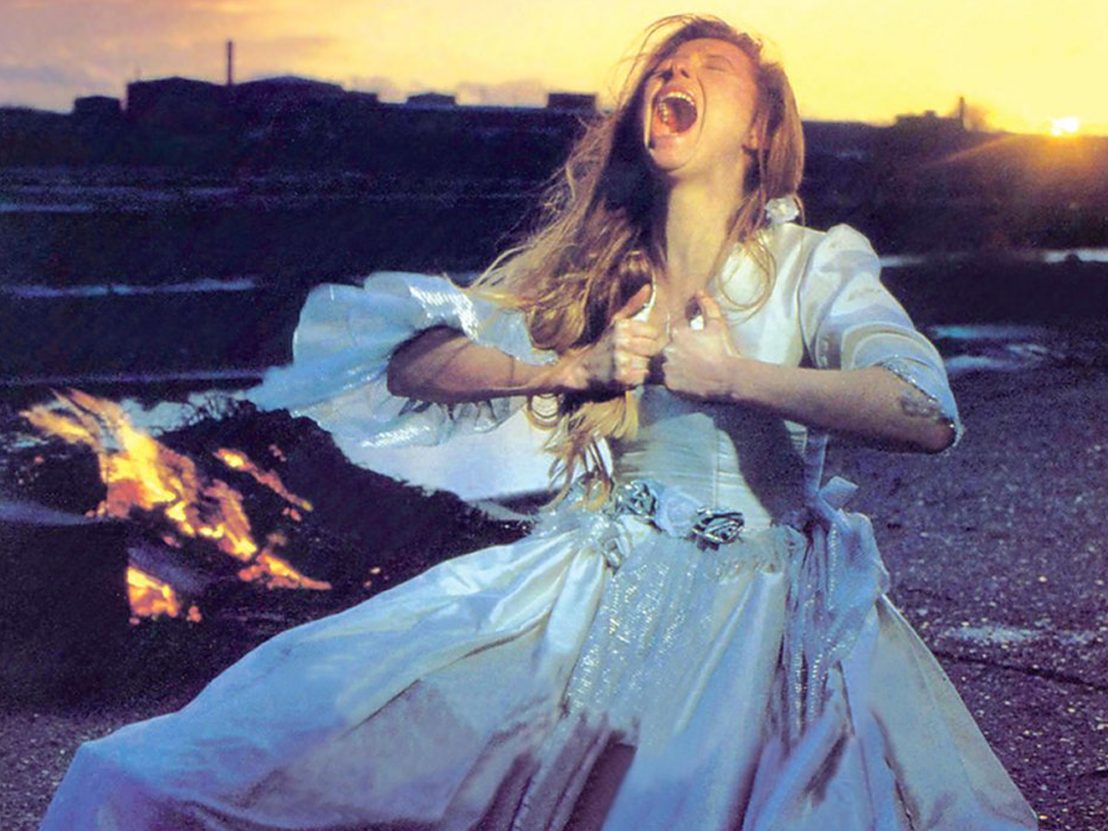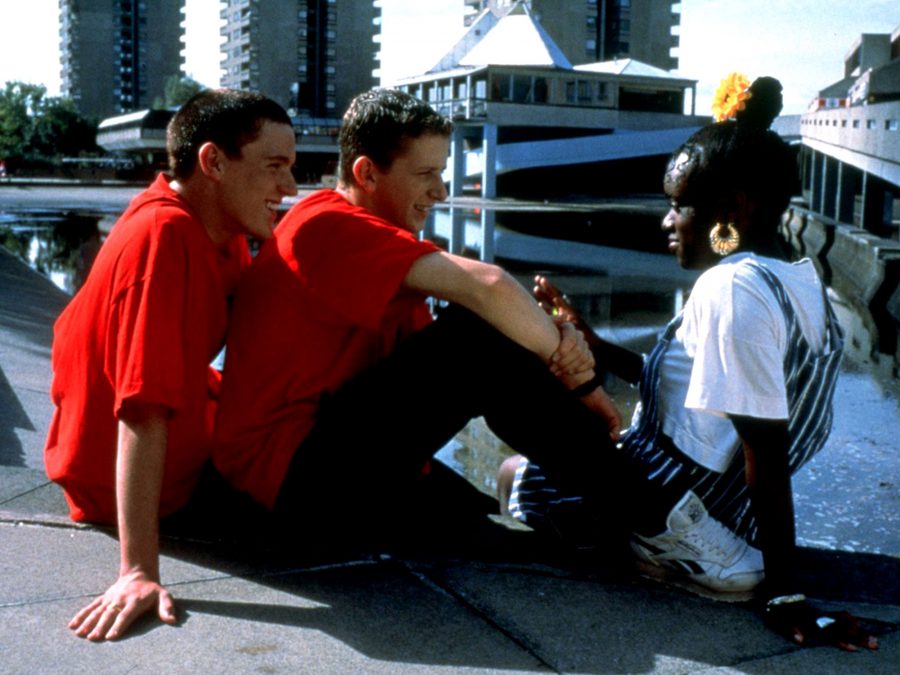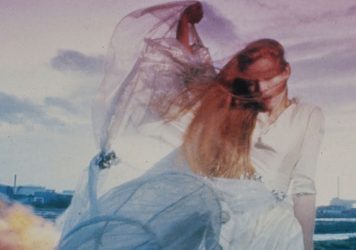
“As someone who was born in 1988, it suddenly struck me that there was this very clear reason I had grown up in a vacuum when it came to queer role models,” Georgia Oakley recently remarked about her remarkably assured directorial debut Blue Jean. That very clear reason was Section 28, the draconian policy implemented by Margaret Thatcher’s Tory government which forbade local authorities from ‘promoting’ homosexuality.
Set in 1988, the same year Britain’s most homophobic law in a century was enacted, Oakley’s North East drama centres on Rosy McEwen’s titular P.E. teacher. Outside the workplace, Jean is relatively comfortable in her own skin, effortlessly cool (hence the androgynous David Bowie-esque haircut), and in a loving same-sex relationship. The moment she crosses through the high school gates, however, she’s essentially forced to adopt a heterosexual alter-ego – someone who can’t even express allyship to a bullied, lesbian new student without risking her livelihood.
Blue Jean may well be cinema’s most explicit response to Thatcher’s repugnant crusade, but Section 28 has informed the film world since before it even officially came into effect. Perhaps unexpectedly, it was a BBC Schools drama that led the way.
A direct attempt to confront the impending erasure of the LGBTQ community, Roger Tonge’s Two of Us finds a curious 15-year-old torn between his girlfriend and openly gay best friend – a dilemma resolved during a getaway to the Sussex coast. Depending on which version you see, he either gets dragged back home by the former or runs joyfully into the English Channel with the latter: sadly, the Beeb reportedly insisted on a more heteronormative reshoot and their initial bravery was further undermined by the fact it premiered when its target audience were likely to have been tucked up in bed.
At the same time, the BBC was making a tentative protest, the prolific gay rights activist Derek Jarman was busy expressing his rage. Starring his muse Tilda Swinton as a howling, grief-stricken bride, 1987’s The Last of England is a violent, apocalyptic riposte to the Thatcherism that the avant-garde auteur believed had ravaged his homeland.
Jarman continued to rally against Section 28 both on and off screen until his untimely death from an AIDS-related illness in 1994. The Garden, a typically provocative retelling of Jesus Christ’s crucifixion which substitutes the son of God for a gay male couple, laid bare the further ostracisation of such a ruling. Alongside Ian McKellen, the friend and future foe who publicly came out in a bid to fight the clause, Jarman was instrumental in the early campaign for its repeal.
1988 comedy short Pedagogue, a piece-to-camera in which Neil Bartlett’s university lecturer satirises the idea of homosexuality as a virus, proved opposition to Section 28 didn’t always require the fiercely intense treatment. . Yet once the law was passed, filmmakers appeared to be as apprehensive towards the subject as the nation’s teachers.

It could be argued that films such as 1996’s Beautiful Thing, the charming council estate coming-of-age which had the audacity to actually give its gays a happy ending, were just as combative to Thatcher’s idea of family values. Screenwriter Jonathan Harvey didn’t specifically address the legislation that inspired him to pen the original stage play but the fact a positive romance between two teenage boys existed at all still served as a middle finger to those hoping such relationships would simply disappear.
Following in its footsteps, 1998’s Get Real couldn’t get away with ignoring Section 28 – jock John and geek Steven’s unlikely affair was set amid the hallways of a Basingstoke comprehensive. When the latter writes an anonymous essay about the hardships of being a closeted teen for a student magazine, one teacher refuses its publication on the grounds it has “no place in a decent school.” Interestingly, director Simon Shore revealed the character of a gay teacher wrestling with his conscience was dropped in the hope the clause would be banished by the time the film hit cinemas.
Unfortunately it would be a further five years for the Labour government to overturn the ban in England and Wales (the law was repealed in Scotland in 2000). Yet the damage the Tories had inflicted upon a generation continued to be reflected on screen, particularly in the documentary field where 1989’s Twilight City, an evocative series of interviews with London’s minority groups, had first addressed the issue.
2021’s Rebel Dykes, for example, covers the lesbian activists who famously interrupted a Six O’Clock News broadcast and abseiled into the House of Lords as a protest against the law. Are You Proud? and Hating Peter Tatchell both offer sobering insights into the period when Thatcher’s shadow always loomed ominously, while Sarah Drummond is currently piecing together the first full-length feature doc about Section 28, the Kickstarter-funded Don’t Say Gay.
Let’s not forget Thatcher herself was portrayed on screen, and with perhaps just a little too much sympathy, by Oscar darling Meryl Streep. Frustratingly, if not surprisingly, sanitised biopic The Iron Lady neglected to feature one of her cruellest moments in power: the 1987 Tory Conference speech in which she complained, “Children who need to be taught to respect traditional moral values are being taught that they have an inalienable right to be gay.”
Ironically, Richard E. Grant, who played one of Thatcher’s most vocal critics Michael Heseltine in the same film, did remind audiences of the irreparable harm she caused in Everybody’s Talking About Jamie. In the musical’s most buoyant dance number, ‘This Was Me,’ his one-time drag queen Hugo Battersby reminisces about life in the ‘80s (“Freddie playing on the radio/The Iron Lady couldn’t stop the show”) amid re-enactments of Section 28 protests. It’s a strikingly powerful moment, and in an ideal world, would serve to highlight how much things have progressed.
There have undoubtedly been encouraging signs: in 2010, schools started showing Fit, Rikki Beadle-Blair’s Stonewall-backed drama designed to raise awareness of homophobic bullying. But the continued attempts to silence the LGBTQ community in the classroom shows that Blue Jean – the nods to VHS tapes, SlimFast diets, and watching Blind Date on a Saturday night aside – is dishearteningly still all too timely.
Published 10 Feb 2023

By Sarah Cleary
A closeted lesbian PE teacher grapples with the ramifications of Section 28 as a new student joins her class.

By Sam Moore
In 1976’s Sebastiane and 1986’s Caravaggio, the director refuses to relegate homosexuality to the subtext.

By Sam Moore
In a time of political uncertainty, his bold representations of queerness remain as vital and relevant as ever.